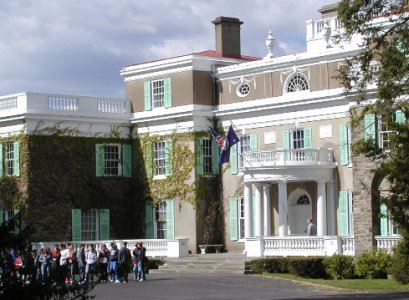Hope From Hyde Park
People are stressed about politics. The rhetoric, the drama, the threats, and the concerns – they all appear to be on the upswing. Is every election “the most important in recent memory” or is 2024 different? It most certainly has been historic, with the media avidly covering the changes, the shifting expectations and the ever more extreme positioning. We are in a period of extreme partisanship, so much so that some wonder if the country is coming apart at the seams. But are things truly that bad? And if we do face great challenges, are there any models or figures that might help us think through how to address these daunting difficulties?
To re-adjust my perspective and to gather hope, I recently visited the Franklin D. Roosevelt Presidential Library and Museum. Located on the beautiful family estate in Hyde Park, NY, not far from the banks of the Hudson River, the trip to the compound was exactly what I needed. The future President Roosevelt grew up there, lived there on and off throughout his life (it was his mother’s house), and is buried on the grounds. It is a National Park Service site, as FDR wanted, with frequent tours and inquisitive and appreciative tourists from all over the globe. Roosevelt was born to a generation who lived through the US Civil War (1882). When he passed away in the latter stages of WWII in 1945, the United States was securing its role as the preeminent military power in the world as a staunch defender of democracy. It is hard to suggest a political leader more responsible for that dramatic change. He truly was one of the most important figures in the 20th century.
The FDR story – born to wealth and privilege with expectations of service – is a vital reminder of character and leadership. Far from perfect, Roosevelt was a complicated and complex man, a masterful politician who reshaped the presidency and America. He worked tirelessly to help the US navigate the Great Depression, keeping American values alive. The world’s most horrific conflict, WWII, consumed him. Much of the war’s result can be traced to his resolve. Polio crippled him, yet his confidence and enthusiasm seemed to never lag. A small, rope-driven elevator in the house memorializes the man in a poignant manner. FDR, who simply could not walk after polio, would hoist himself up and down in this little contraption. Grandchildren would sit on his lap, the guard told us, and the president insisted on using the rope himself to get to the next floor. It is incongruous and telling, a personal fact that renders this extraordinary political leader all the more driven and all the more human.
Perhaps my greatest takeaway was one of overwhelming gratitude to FDR and those around him who fought the good fight, who worked to keep the country strong, to improve the lives of others, to secure the four freedoms that are essential to modern life. The economy may be troublesome now, but current difficulties pale in comparison to the hardship of the 1930s. The world may be contentious and dangerous now, but we are not facing a global conflict akin to WWII. And on a personal note, while I may face difficulties and responsibilities that, at times, may seem unfairly burdensome, FDR handled a million times more stresses and did so with values, elan and success.
The day at Hyde Park was humbling, inspirational, and a much needed remedy for today’s stresses. I encourage you to find the time to visit and reflect.
David Potash
